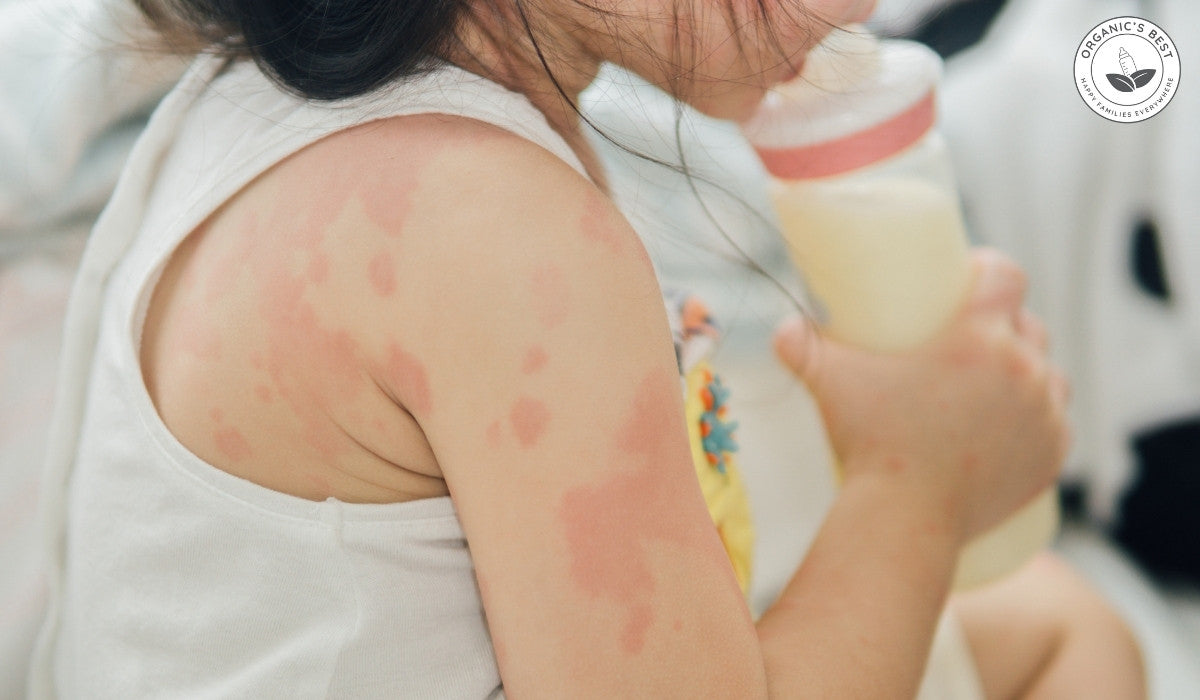Click to Get 2 FREE Boxes/Cans
Click to Get 2 FREE Boxes/Cans
Only New Customers! Click HERE to Get 2 Extra Boxes/Cans for Free With Your First Order.
Only New Customers! Click HERE to Get 2 Extra Boxes/Cans for Free With Your First Order.
BABY FORMULA
Offering new parents top-quality European infant formula from renowned brands like HiPP, Holle, Kendamil, and more. If you’re uncertain about which product to choose, our Formula Finder can help you make the best decision for your baby.
Baby Food
Offering new parents a premium selection of European baby foods, including jars, pouches, cereals, and snacks from esteemed brands like HiPP and Holle.
Understanding Cow Milk Protein Allergy in Babies: CMPA Formula Options
by Agustina Fernandez November 26, 2024 8 min read

For centuries, babies have thrived on animal milk, with cow's milk becoming a commercial staple as early as the 1800s. So, it's easy to assume that this tried-and-tested option would be a great source of nourishment for your baby.
But what happens when it isn't? For some infants, particularly in their first year of life, cow's milk doesn't sit well. Their tiny bodies can react in ways that range from mild discomfort to severe symptoms.
One of the most common and often confusing reasons for these reactions is a cow's milk protein allergy (CMPA). If your baby has been dealing with persistent skin rashes, troubles in the tummy department, or even breathing issues after feedings, CMPA could be the underlying cause.
Babies suspected of CMPA should have a thorough evaluation by a pediatrician or allergist. Blood or skin prick tests can help, but the gold standard often includes a medically supervised elimination diet and re-challenge.
In this article, we'll unpack everything you need to know about CMPA: what it is, why it happens, and how you can support your little one by choosing the right formula. Let's dive in!
Table of Contents
What is CMPA in Babies?
Cow milk protein allergy (CMPA) is often mistaken for other conditions like lactose intolerance or reflux because the symptoms can look similar. To clear up the confusion, let's break it down: what exactly is cow's milk protein, how does it affect the body, and why does this allergy happen in the first place?
First, let's look at the what - To put it simply, cow milk protein allergy (CMPA) is an immune-mediated condition in which a baby's body has an allergic reaction to proteins found in cow's milk.
Essentially, this means that their immune system mistakes these proteins as harmful and triggers an allergic response. It's crucial to understand that a cow's milk allergy is different from lactose intolerance.
While lactose intolerance symptoms in babies are caused by the body's inability to break down lactose (a sugar found in milk), a cow's milk allergy involves an immune response to the milk proteins.
If your child has been diagnosed with a cow milk allergy, take comfort in knowing you're not alone. CMPA is one of the most common food allergies diagnosed in infants and children. As published in the National Library of Medicine, the "prevalence (of cow's milk protein allergies) in developed countries ranges from 0.5% to 3% at age 1 year".
The good news? Evidence suggests that most children outgrow CMPA as they grow, with about 50% overcoming the allergy within the first year and 80-90% by age 5. However, for others, a cow's milk allergy may persist into later childhood or even adulthood, so it's essential to manage it properly in the early stages.
Cow Milk Protein Allergy Symptoms
Now let's look at the how - The symptoms of CMPA can vary significantly from one baby to the next. Some may only experience mild discomfort, while others can show more severe signs of an allergic reaction.
Let's take a closer look at the various reactions, categorizing them by where they manifest.

Skin Reactions:
-
Eczema
-
Hives
-
Itchy skin
A CMPA rash often occurs soon after the baby is fed cow's milk-based formula or breast milk containing dairy proteins. Eczema, for instance, is a common sign that the immune system is reacting to the milk proteins.
Digestive Issues:
-
Vomiting
-
Abdominal cramps
-
Constipation
-
Blood in the stool
If your baby is experiencing frequent and unexplained digestive issues, CMPA could be the cause. The digestive system's response to cow's milk proteins can lead to inflammation, which disrupts normal bowel movements.
Respiratory Symptoms:
-
Wheezing
-
Coughing
-
Difficulty breathing
While these respiratory symptoms aren't as common as digestive or skin-related symptoms, they can still occur. Respiratory distress can be a serious sign of a cow's milk allergic reaction, and immediate medical attention should be sought if your baby is experiencing trouble breathing.
Other General Symptoms:
-
Irritability or fussiness (often due to discomfort from tummy issues)
-
Poor weight gain or failure to thrive (if digestive issues persist)
-
Swelling of the face, lips, or tongue (in more severe allergic reactions)
If your baby is experiencing any combination of these symptoms, it's crucial to consult your pediatrician for a proper diagnosis.
CMPA can be challenging to identify since its symptoms often overlap with other conditions, like reflux or lactose intolerance, making a thorough evaluation essential. Keeping a detailed record of when symptoms occur and how often they happen can help your doctor better understand what's going on and provide the proper guidance.
What Causes CMPA in Babies?
Lastly, let's look at the why - The answer to this question is slightly more complicated because the exact cause of a cow's milk allergy is still not fully understood, and there are various theories for why the immune system overreacts to these proteins.
In babies with a cow's milk allergy, the immune system mistakenly treats the proteins in cow's milk as dangerous invaders. This sets off a cascade of immune responses, which lead to the milk allergy symptoms in babies that we discussed earlier.
While we don't know precisely what causes the immune system to overreact in some babies, there are several factors that might contribute:

-
Genetics: A family history of allergies (such as hay fever, asthma, or eczema) can increase the likelihood that a baby will develop a cow's milk allergy.
-
Premature Birth: Premature infants may have immature immune systems, which makes them more susceptible to developing food allergies.
-
Early Exposure to Cow's Milk: In some cases, babies who are exposed to cow's milk proteins early in life (via baby formula or breast milk from mothers consuming dairy) may be more likely to develop a cow's milk allergy.
-
Environmental Factors: Some researchers believe that environmental exposures or lifestyle factors (such as the introduction of solid foods or the presence of allergens in the home) may also play a role.
How to Help Babies Allergic to Cow's Milk
If your baby has been diagnosed with a cow's milk allergy, the best way to help them feel better is by eliminating cow's milk proteins from their diet. This can be done in a few different ways, depending on whether you're breastfeeding or using formula.

Exclude Cow Milk Protein from Your Baby's Diet
The first step in managing a cow's milk allergy is to eliminate cow's milk proteins from your baby's diet. If you're breastfeeding, this might mean completely eliminating dairy from your own diet. If you're formula feeding, this might mean changing your baby's formula from a cow's milk source to an alternative option.
Avoid Consuming Dairy Products While Breastfeeding
If a cow's milk allergy is suspected in a breastfed baby, a mother may be advised to avoid dairy products in her diet. The level of cow's milk protein in breast milk is much lower than in cow's milk directly, but it may still cause problems in sensitive babies. Foods like milk, cheese, yogurt, and other dairy products that contain cow's milk proteins should be avoided. It's crucial to read labels carefully and consider dairy alternatives like almond, soy, or oat milk.
Select the Right Baby Formula
When it comes to formula feeding, the best way to help your baby is by selecting a formula designed for babies with a cow's milk allergy. Here are the main options:
Hypoallergenic Formula (HA)
Hypoallergenic formula is often given to babies with allergies, as it contains proteins that have been broken down into smaller fragments, which are more easily digested and less likely to trigger an allergic response.
Specialty Comfort Formula
These formulas are sometimes recommended for mild cases of cow's milk allergy or lactose intolerance under a doctor's guidance, but they are primarily intended for babies experiencing general digestive issues like colic, constipation, or gas. Comfort formulas typically include partially hydrolyzed proteins, which are easier to digest.
Amino Acid Formula
For most babies with CMPA, an extensively hydrolyzed formula is sufficient for keeping symptoms at bay. However, some little ones with a more severe presentation of CMPA require an amino acid formula. These formulas are made of individual amino acids, the building blocks of proteins. Since there are no intact proteins in these formulations, they can be tolerated by babies with cow's milk protein allergy.
Plant-Based Formula
In some cases, plant-based formulas made with alternative protein sources like soy or rice may be an option. These formulas are completely free of dairy and, therefore, are suitable for babies with severe CMPA and also lactose intolerance.
Best Possible Formula Options for CMPA
As mentioned earlier, specific formulas are well-suited for babies with cow's milk allergies. Below are some of the most highly recommended European options.

HiPP Comfort Formula
HiPP Comfort formula is designed to help babies with colic and gas, offering gentle relief from birth onwards. The formula includes extensively hydrolyzed milk proteins, prebiotics, beta-palmitate, and reduced lactose levels to support digestion and gut health.
The UK and German versions vary in terms of probiotics and folate sources. While HiPP Comfort UK has only prebiotics and uses folic acid, HiPP Comfort German also includes probiotics and uses Metafolin instead of folic acid. Parents choose HiPP Comfort for its effectiveness in reducing colic symptoms and improving stool consistency, though it may not be suitable for babies with a cow's milk allergy, and it is not suitable for lactose intolerance, so speak with your pediatrician first.
HiPP HA Formula: Dutch and German
Backed by over 25 years of research, HiPP Hypoallergenic formula uses extensively hydrolyzed milk proteins, probiotics, and prebiotics to support your baby's gut health and immune system while minimizing allergenic reactions. HiPP HA is free from common allergens, GMOs, and artificial additives. It is available in German, Dutch, and ready-to-feed variations, with each stage tailored to support your baby's growth and development from birth through their first year.
Clarifying Some Terms Related to Intolerance, Sensitivity, and Allergy
It's easy to get confused when talking about a cow's milk allergies, sensitivities, and intolerances, so let's clarify the differences between the three:
Milk Allergy vs Lactose Intolerance in Babies
CMPA is an immune response to cow's milk proteins, while lactose intolerance is a digestive issue where the body lacks the enzyme lactase to properly break down lactose.
Cow Milk Sensitivity vs Cow's Milk Protein Allergy
A sensitivity refers to a milder reaction to milk that doesn't involve the immune system, while CMPA is a true allergy and can result in severe symptoms.
CMPI vs CMPA
A Cow's Milk Protein Intolerance refers to a milder form of reaction compared to a cow's milk allergy, which is typically more severe.
FAQs on Cow's Milk Protein Allergy
Here are the answers to some of your most asked questions about a cow's milk allergy.
How Long for CMPA Symptoms to Go Away?
Once cow's milk proteins are eliminated, symptoms usually begin to improve within a few days to a week. However, it can take 2-4 weeks for the body to fully rid itself of the proteins.
Can Babies with CMPA Have Goat Milk Formula?
No, goat milk formulas are not recommended for children with a confirmed or suspected diagnosis of CMPA. Although goat milk proteins differ from cow milk proteins, they are still structurally similar enough to trigger allergic reactions in babies with CMPA.
Do Babies Outgrow CMPA?
Many babies will outgrow a cow's milk allergy as their immune systems mature. By the age of 3-5 years, up to 90% of babies with CMPA will be able to tolerate dairy without any issues.
What Does CMPA Baby Poop Look Like?
CMPA stools differ from normal baby poop in several ways. The most noticeable symptom is the presence of blood in the stool. Additionally, the stools may become more frequent, watery diarrhea, and may contain mucus.
|
Disclaimer: Please be aware that this information is based on general trends in babies, and it is not medical advice. Your doctor should be your first source of information and advice when considering any changes to your child’s formula and when choosing your child’s formula. Always consult your pediatrician before making any decisions about your child’s diet or if you notice any changes in your child. Breastfeeding is the best nutrition for your baby because breast milk provides your child with all the essential nutrients they need for growth and development. Please consult your pediatrician if your child requires supplemental feeding. |
Agustina Fernandez
Dr. Agustina Fernandez earned her medical degree from the prestigious Universidad Nacional de Córdoba, Argentina. With a deep-rooted passion for pediatrics, Dr. Fernandez is currently on the path to specializing in children's healthcare. Recently, she has delved into the vital field of infant nutrition. Her research interests include breastfeeding, infant formula, and baby food in little ones’ formative years. Dr. Fernandez's commitment to this area of study underscores her dedication to ensuring the health and well-being of children from their earliest days.
Leave a comment
Comments will be approved before showing up.
Also in Organic Infant Nutrition and Health Blog

10 Winter Activities for Kids and Toddlers
by Agustina Fernandez January 06, 2026 8 min read
Read More
How to Choose The Best Infant Formula: A Guide to EU Organic Formulas
by Agustina Fernandez January 05, 2026 14 min read
Read More
Best Formula for Breastfed Babies 2026 Guide
by Agustina Fernandez January 05, 2026 15 min read
Read More
Reviewed by Dr. Bardha Citaku, MD
-

Dr. Bardha Citaku: Medical Reviewer of Organic's Best Blog
Dr. Bardha Citaku completed her medical studies at the University of Prishtina in Kosovo, where she began her journey into the field of medicine. She has since developed a career in medical research, contributing to projects with notable organizations, including the World Health Organization (WHO).
